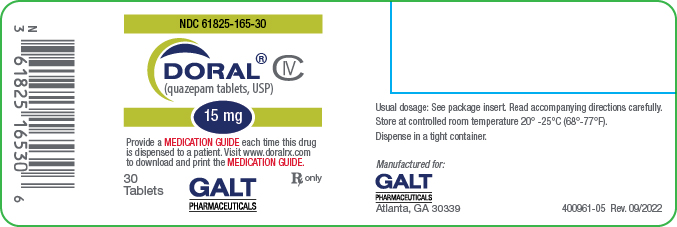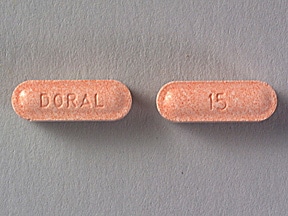Doral
Generic name: quazepam
Drug class: Benzodiazepines
Medically reviewed by A Ras MD.
What is Doral?
Doral is a prescription medicine used to treat certain types of insomnia including difficulty falling asleep, waking up often during the night, or waking up early in the morning.
Doral is a federal controlled substance (C-IV) because it can be abused or lead to dependence. Keep Doral in a safe place to prevent misuse and abuse. Selling or giving away Doral may harm others, and is against the law. Tell your healthcare provider if you have ever abused or been dependent on alcohol, prescription medicines or street drugs.
It is not known if Doral is safe and effective in children.
Description
DORAL contains quazepam, a trifluoroethyl benzodiazepine hypnotic agent, having the chemical name 7-chloro-5- (o-fluoro-phenyl)-1,3-dihydro-1-(2,2,2- trifluoroethyl)-2H-1,4-benzodiazepine-2-thione and the following structural

Quazepam has the empirical formula C 17H 11ClF 4N 2S, and a molecular weight of 386.8. It is a white crystalline compound, soluble in ethanol and insoluble in water.
Each DORAL Tablet contains 15 mg of quazepam. The inactive ingredients for DORAL Tablets include cellulose, corn starch, FD&C Yellow No. 6, lactose, magnesium stearate, silicon dioxide, and sodium lauryl sulfate.
Mechanism of Action
DORAL, like other central nervous system agents of the 14-benzodiazepine class, presumably exerts its effects by binding to stereo-specific receptors at several sites within the central nervous system (CNS). The exact mechanism of action is unknown.
What is the most important information I should know about Doral?
- Doral is a benzodiazepine medicine. Taking benzodiazepines with opioid medicines, alcohol, or other central nervous system depressants (including street drugs) can cause severe drowsiness, breathing problems (respiratory depression), coma and death.
- Doral may cause serious side effects that you may not know are happening to you. These side effects include:
- sleepiness during the day
- not thinking clearly
- acting strangely, confused, or upset
- “sleep-walking” or doing other activities when you are asleep like:
- eating
- talking
- having sex
- driving a car
Call your healthcare provider right away if you find out that you have done any of the above activities after taking Doral.
- Do not take Doral unless you are able to stay in bed a full night (7 to 8 hours) before you must be active again.
- Do not take more Doral than prescribed.
Who should not take Doral?
Do not take Doral if you:
- are allergic to quazepam or any of the ingredients in Doral. See the end of this Medication Guide for a complete list of ingredients in Doral.
- have had an allergic reaction to other sleep medicines or sedatives such as benzodiazepines. Symptoms of a serious allergic reaction can include:
- have sleep apnea, breathing or lung problems
What should I tell my healthcare provider before taking Doral?
Before you take Doral, tell your healthcare provider about all of your medical conditions, including if you:
- have a history of depression, mental illness or, suicidal thoughts
- have a history of drug or alcohol abuse or addiction
- have lung disease or breathing problems
- are pregnant or plan to become pregnant. It is not known if Doral can harm your unborn baby.
- are breastfeeding, or plan to breastfeed. Doral can pass through your breast milk and may harm your baby. Talk to your healthcare provider about the best way to feed your baby if you take Doral.
Tell your healthcare provider about all of the medicines you take, including prescription and over-the-counter medicines, vitamins, and herbal supplements.
Taking Doral with certain other medicines can cause side effects or affect how well Doral or the other medicines work.
Do not start or stop other medicines without talking to your healthcare provider.
Do not take Doral with other medicines that can make you sleepy unless your healthcare provider tells you to.
How should I take Doral?
- See “What is the most important information I should know about Doral?”
- Take Doral exactly as your healthcare providers tell you to take it.
- Doral comes in 15 mg tablets. Your healthcare provider may start your Doral dose at 7.5 mg which is half a tablet. Talk to your healthcare provider or pharmacist about your dose schedule.
- If you take too much Doral or overdose, get emergency treatment right away.
What should I avoid while taking Doral?
- Do not drive, operate machinery, do other dangerous activities or do anything that needs you to be alert until you know how Doral affects you. You may still feel drowsy the next day after taking Doral.
- You should not drink alcohol while you are taking Doral.
What are the possible side effects of Doral?
Doral may cause serious side effects, including:
- See “What is the most important information I should know about Doral?”
- Withdrawal symptoms. You may have withdrawal symptoms if you stop taking Doral suddenly. Withdrawal symptoms can be serious and include seizures. Mild withdrawal symptoms include a depressed mood and trouble sleeping. Talk to your healthcare provider about slowly stopping Doral to avoid withdrawal symptoms.
- Other conditions. Call your healthcare provider if your insomnia worsens or is not better within 7 to 10 days. This may mean that there is another condition causing your sleep problem.
- Severe allergic reactions. Symptoms include swelling of the tongue or throat, and trouble breathing. Other symptoms may include nausea and vomiting. Get emergency medical help right away if you have these symptoms after taking Doral.
- Abnormal thoughts and behavior. Symptoms include more outgoing or aggressive behavior than normal, confusion, agitation, hallucinations, worsening of depression, and suicidal thoughts.
- Depression. Pre-existing depression may emerge or worsen during use of benzodiazepines including Doral.
- Abuse and dependence. Taking Doral can cause physical and psychological dependence. Physical and psychological dependence is not the same as drug addiction. Your healthcare provider can tell you more about the differences between physical and psychological dependence and drug addiction.
Call your healthcare provider right away if you have any of the above side effects while taking Doral. The most common side effects of Doral include:
- drowsiness
- headache
- feeling very tired
- dizziness
- dry mouth
- upset stomach
After you stop taking a sleep medicine, you may have symptoms for the next 1 to 2 days such as:
- trouble sleeping
- nausea
- flushing
- lightheadedness
- uncontrolled crying
- vomiting
- stomach cramps
- panic attack
- nervousness
- stomach area pain
These are not all the possible side effects of Doral. Call your doctor for medical advice about side effects. You may report side effects to FDA at 1-800-FDA-1088.
General information about the safe and effective use of Doral
Medicines are sometimes prescribed for purposes other than those listed in a Medication Guide. Do not use Doral for a condition for which it was not prescribed. Do not give Doral to other people, even if they have the same symptoms that you have. It may harm them. You can ask your healthcare provider or pharmacist for information about Doral that is written for healthcare professionals.
How should I store Doral?
Store at room temperature between 68°F to 77°F (20°C to 25°C). Keep Doral and all medicines out of the reach of children.
Label
PRINCIPAL DISPLAY PANEL


